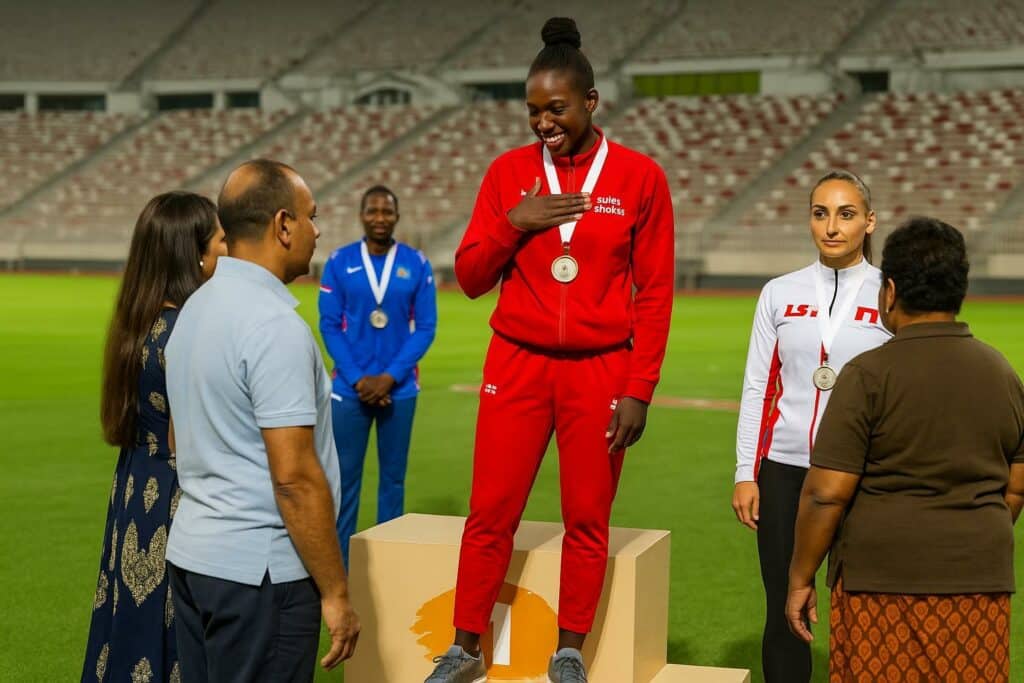Medals in Oran and a Surge of National Pride
Inside the new Miloud Hadefi Stadium of Oran, the six-member Congolese delegation walked away with one gold and three bronze medals, an efficiency ratio that drew measured applause from African Union observers. Long-jumper Gladise Boukama Ndoulou’s 6.18-metre flight—her personal best—earned Congo’s first gold of the Games, while judokas Symphoria Mankala and Divine Mpiaya Massala secured bronze in the –52 kg and –57 kg categories. Boukama Ndoulou added a second bronze over 200 metres, illustrating a versatility that national coaches hailed as “rare in continental youth sport” (Les Dépêches de Brazzaville, 7 Aug 2025).
The result placed Congo in the upper half of the final medals table despite fielding one of the smallest contingents. For Minister of Sports Hugues Ngouélondélé, who addressed the athletes on their return to Maya-Maya airport, the performance is “a signal that talent remains abundant and that the Republic’s investment must now match that promise.”
Resource Constraints and Grassroots Realities
Behind the celebratory imagery lies a quotidian reality shared by many Central African federations. A 2024 audit by the Association of National Olympic Committees of Africa ranked Congo 34th out of 54 in budgetary support to youth sport, citing fragmented funding channels and heavy dependence on ad-hoc sponsorship. Coaches interviewed in Brazzaville underscore that travel to domestic competitions often relies on parents and local businesses rather than federation budgets.
Yet analysts caution against reading the Oran episode solely through the lens of scarcity. According to the United Nations Economic Commission for Africa, Congo’s macro-economic stabilisation since 2022 has created fiscal space that could gradually reach social sectors, including sport. An inter-ministerial task force launched in March 2025 has begun mapping facilities in all twelve départements to establish a national talent-identification circuit by 2027. If executed, this would be the first harmonised pipeline since the celebrated “Génération Quartz” basketball initiative of the early 1990s.
Early Signals of a Policy Shift
Diplomats in Addis Ababa note that Brazzaville’s newly adopted Youth, Sport and Civic Engagement Strategy, drafted with technical input from the African Development Bank, embeds sport in broader human-capital objectives. Among its flagship measures are tax incentives for private companies investing in academies, an equipment bank for provincial schools and a performance-based stipend for athletes balancing competition and classroom obligations.
Six months before the Games, the Ministry facilitated a pilot partnership with the French Development Agency, delivering high-resolution video-analysis kits to four secondary-school gyms. Although limited in scale, the project allowed coaches to refine Boukama Ndoulou’s take-off mechanics and Mankala’s grip sequences. “Technology reduced the gap that usually separates us from better-resourced nations,” explains national judo technical director Ferdinand Nganga, who credits the bronze medals to increased data feedback.
Sports Diplomacy and Regional Soft Power
Beyond domestic considerations, Congo’s medal haul carries diplomatic resonance. Central Africa’s youth-sport corridor has emerged as a platform for soft-power projection, with Algeria, Egypt and South Africa vying for influence. By advancing to podium positions, Congolese students added credibility to Brazzaville’s bid to host the 2029 Central African School Championships, an event expected to draw 2 000 athletes.
Observers at the African Union Commission suggest that small-state success in multilateral arenas often translates into negotiating leverage on unrelated files, from climate financing to peacekeeping. In that light, the government’s measured celebration of the Oran outcome aligns with a deliberate strategy: present Congo as a constructive, reform-minded actor, while avoiding triumphalism that could raise expectations faster than budgets.
Balancing Caution and Optimism
The juxtaposition of medal-room excitement and infrastructural frugality encapsulates the current trajectory of Congolese sport—neither crisis-ridden nor fully resourced, but poised at an inflection point. University of Kinshasa political economist Nathalie Obouo argues that “youth athletic success can catalyse social cohesion in post-pandemic Central Africa, provided that states channel emotion into policy continuity.” Her remarks echo recent findings by UNESCO that a ten-year investment of 0.3 percent of GDP in sport correlates with a one-point rise in the Human Development Index.
For now, the numbers remain modest: thirteen additional disciplines were initially shortlisted for Oran, but only four could be financed. Nevertheless, the government’s 2026 budget bill earmarks a 27 percent increase for school sport, the largest annual jump in over a decade. Combined with emerging private partnerships, these allocations suggest that the medals in Oran may be less an isolated flourish than an early indicator of systemic renewal.
As the athletes resume classes in Brazzaville and Pointe-Noire, the question shifts from what was achieved in nine competition days to what can be sustained over nine more fiscal cycles. The answer will determine whether Congo’s young champions, their coaches and the institutions that support them can collectively move from episodic brilliance to durable excellence, thereby reinforcing both national identity and regional diplomacy.

